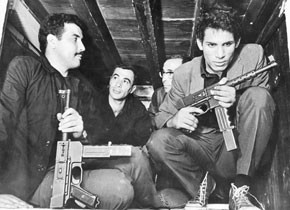Gillo Pontecorvo
January 10 to February 5, 2014
Gillo Pontecorvo (1919-2006) is one of the most remarkable "cases" of postwar cinema: he was only able to direct five full-length feature films. Three of these, however – Kapò (1960), Battle of Algiers (1966), and Queimada (1969) – became axiomatic works of their era(s). Nevertheless, he remained a kind of phantom of film history, an artistic presence that can be viewed as marginal yet complete: his works have a rounded perfection; they are as immaculately designed as they are cleverly and concisely argued.
Pontecorvo’s five solitaires revolve around one thematic circle: politics and violence. How one creates politics through violence; how politics provokes violence; what violence does to people as well as what people will do and allow to be done to themselves in extreme situations. Pontecorvo knew about these things: from the winter of 1942 to the end of World War II, he lived with the Underground, fighting alongside communist partisans and participating in the organization of a common front for the liberation of Italy. Accordingly, his works never give in to reductiveness; they demonstrate that some problems are unsolvable, and they repeatedly emphasize the situational necessity of violent solutions.
The son of a bourgeois Jewish family from Pisa, Pontecorvo always kept his allegiance to communism, although not to the Party, even though the long-time head of the PCI, Enrico Berlinguer, was one of his closest friends. He didn't last as long with journalism, his original profession. By his own description, he was seduced into cinema by Rossellini's Paisà (1946) and Nikolaj Ėkk's Road to Life (1931) – starting out with short documentaries that served as a good education for him.
His feature film debut, La grande strada azzurra (1957) with Yves Montand, made an immediate impact. Kapò, as controversial as it was celebrated, established him as one of the most important Italian film directors of his generation. His career reached its zenith when he won the Golden Lion for La battaglia di Algeri. The ecstatic-epic revolutionary western Queimada (1969), with Marlon Brando, proved to be his final success at the box office. Following that, it was nearly impossible for Pontecorvo to make films in tune with his political convictions. However, he was able to make Operación Ogro (1979) in Spain after the fall of Franco – an almost forgotten and politically charged thriller version of Battle of Algiers. Neither Pontecorvo's project about the defenestration of the anarchist Giuseppe Pinelli, nor his wonderfully titled “Jesus project”, I tempi della fine, about the frenetic expectations of a messiah, could find financing. So he remained silent and simply observed how his works continued to exert their influence.
Related materials
Photos 2014 - Dominik Graf


